
 |
|
|
#1 |
|
(deceased)
Join Date: Dec 2004
Location: East Coast USA
Posts: 3,191
|
Hi Guys
This is the other item I picked up this week. A nice example of Ngbandi spear? It seems a bit short to me even though it measures 68" long is it possible that it was shortened at some point in it's life? Let me know what you think. Lew Last edited by LOUIEBLADES; 29th July 2005 at 12:23 PM. |
|
|

|
|
|
#2 |
|
Member
Join Date: Dec 2004
Location: What is still UK
Posts: 5,958
|
Lew,
That spear looks absolutely fine to me, a close up of the end would be helpful. From what we see at the moment it is a really great spear ,super find. Tim+Sam |
|
|

|
|
|
#3 |
|
Member
Join Date: Dec 2004
Location: Sint-Amandsberg (near Ghent, Belgium)
Posts: 830
|
You are quite right : a Ngbandi spear. There's nothing wrong with the length of your spear. I have a similar one which measures about 63 inches (157,5 cm).
Don't forget these were weapons for close combat, stabbing spears. The long blades of Ngbandi spears were used for thrusting through the shield of the opponent. I see some nice carving on the handle. The metal 'shovel-type' butt is not typical, but spear blades were traded all over Central Africa. It's possible that the owner preferred that type of butt end to the more conventional one. Nothing wrong with that either. Later, I will post some pictures of butt ends on the forum. |
|
|

|
|
|
#4 |
|
Member
Join Date: Dec 2004
Location: Sint-Amandsberg (near Ghent, Belgium)
Posts: 830
|
Nothing wrong with that butt, just another type.
 Here are some pics of different spear butts from the Congo area Typical spear butt found on Ngbandi spears, but also used by the following tribes : Bati, Benge, Poto, Ngombe and Gens d'Eau. Mostly made of iron and rather heavy. To counter balance the weight of the big spear blade. (Length : 8 cm) 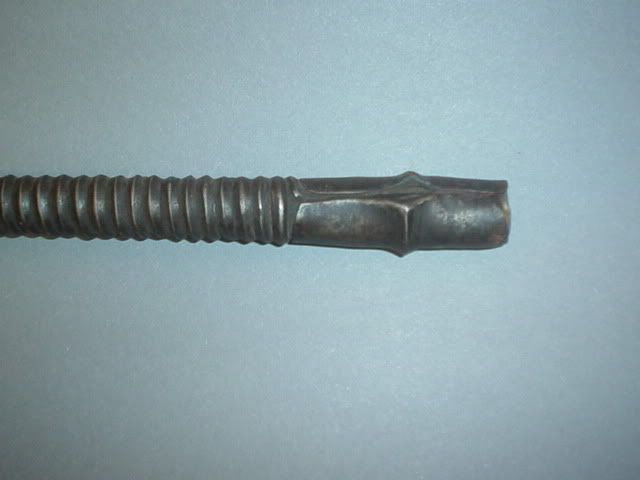 Top to bottom : Bell as found on spears coming from the Mongo-tribes (Length : 29 cm, width : 10 cm) Long iron spike, Ngbandi spear. (Length : 55 cm) 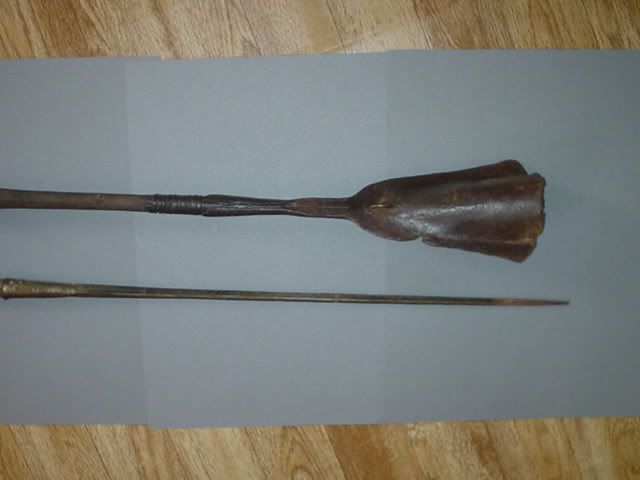 Three smaller spears (top to bottom) From the Nkundu, Lia or Konda-tribes, made from copper. (Length : 8 cm) End of an light spear, tribe unknown (Length : 8,5 cm) Butt end of a small spear from the Bana-pygmees, Aruwimi-area (Congo)(Length : 19,5 cm) 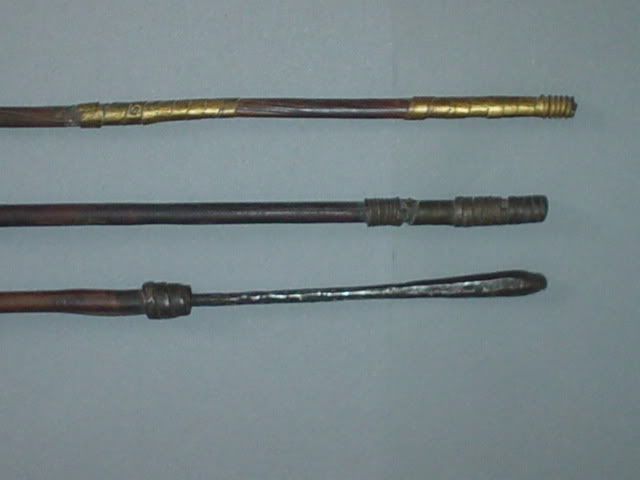 Two butt ends of thrusting spears (top to bottom) Used by following tribes : Ngbaka, Ngombe, Doko. The butt end is wrapped with iron banding. (Length : 19 cm) Atypical spear butt from an unknown tribe (Congo-area). Looks like a spear head, but is not sharpened. (Length : 19,5 cm) 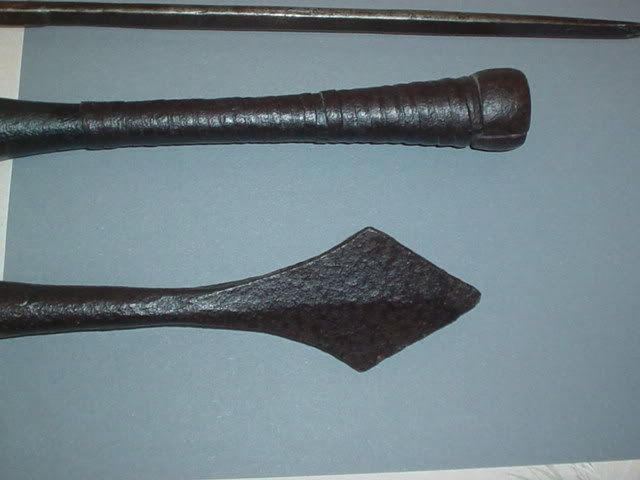 I have to measurements to give you an idea, this doesn't mean the butt ends are always exactly this size. These can vary quite considerably. |
|
|

|
|
|
#5 |
|
Member
Join Date: Dec 2004
Location: What is still UK
Posts: 5,958
|
This spear butt is also from the congo. A heavy octagonal spike, the pin in the female socket also seems to be a congo thing. You do not see it in southern spears or those from the east and the horn, I have not seen it from the western trade coasts or the north though I have seen a pin in the blade socket in Hausa and other northern spears. Tim
|
|
|

|
|
|
#6 |
|
(deceased)
Join Date: Dec 2004
Location: OKLAHOMA, USA
Posts: 3,138
|
THE BEST ARTICLE ON BUTTS EVER ON THE FORUM !
ONE APPEARS TO HAVE A BELL ON IT IS IT A DANCING BUTT 
|
|
|

|
|
|
#7 |
|
Member
Join Date: Dec 2004
Location: What is still UK
Posts: 5,958
|
Lets all do the konga!!!

|
|
|

|
|
|
#8 |
|
Member
Join Date: Dec 2004
Location: Kernersville, NC, USA
Posts: 793
|
Lew, you've got the bestest toys!
Steve |
|
|

|
|
|
#9 |
|
Member
Join Date: Dec 2004
Posts: 987
|
Yes, yes, very cool stuff. But what I want to know is...what in blazes is your avatar, Freddy?
 It looks like the Planter's Peanut man with a really bad sunburn. He seems to be holding a naginata, though. It looks like the Planter's Peanut man with a really bad sunburn. He seems to be holding a naginata, though.
|
|
|

|
|
|
#10 | |
|
Member
Join Date: Dec 2004
Location: Sint-Amandsberg (near Ghent, Belgium)
Posts: 830
|
Quote:
Here's a better picture : 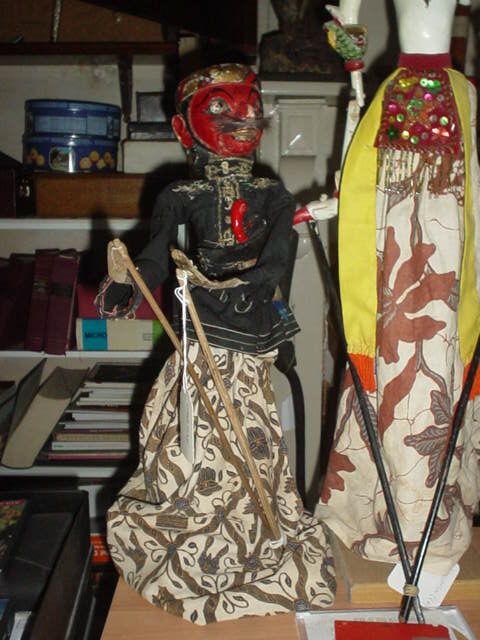
|
|
|
|

|
|
|
#11 |
|
Member
Join Date: Feb 2005
Location: Chicago area
Posts: 327
|
I have a feeling that the stuff Freddy & Vandoo have collected might be as interesting as a visit to a museum.
|
|
|

|
|
|
#12 |
|
Member
Join Date: Dec 2004
Posts: 987
|
Aha.
 He actually doesn't look like the Planter's Peanut man when you see him close up. Very nice. I have two Burmese marionettes, a warrior and a prince (carrying a dha and a dagger, respectively), which I rather like. He actually doesn't look like the Planter's Peanut man when you see him close up. Very nice. I have two Burmese marionettes, a warrior and a prince (carrying a dha and a dagger, respectively), which I rather like. 
|
|
|

|
|
|
#13 |
|
Member
Join Date: Jul 2005
Location: GA USA
Posts: 76
|
Hi I am new here. I just want to ask Freddy if he has a Boa tribe spear. I could not found one and I looked hard. Belgium is the heaven for the African Weapon collection. You must have one!!:-).
|
|
|

|
|
|
#14 |
|
Member
Join Date: Dec 2004
Location: Sint-Amandsberg (near Ghent, Belgium)
Posts: 830
|
Hi Zalmoxis,
Great to have you here. Look at your private messages for my answer. Freddy 
|
|
|

|
 |
|
|